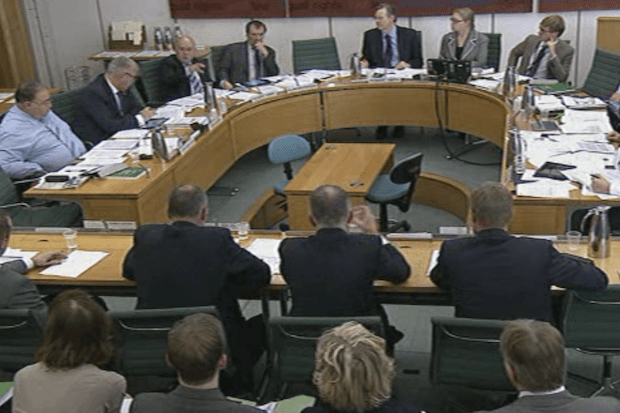Like all good select committee hearings where MPs are grilling some unsuspecting witnesses on something they’ve decided to be very angry about, this hearing of the Energy and Climate Change committee took a very long time. It has been cut off for the time being from Ofgem’s evidence by a series of votes in the Commons, but here’s what we’ve learned from this first mammoth hearing in any case.
The first is that the MPs clearly read Iain Martin’s memo in the Telegraph about show trial-style select committee hearings. Only Ian Lavery managed the kind of fury that all members of these committees normally feel it necessary to manufacture, and even that was just a bit of a lecture rather than a rage. But perhaps the MPs mis-read Iain’s piece: he was advising them to not show off, rather than to not ask useful questions. The only incisive questions have really come from Peter Lilley, which is perhaps reassuring because he is a member of the Number 10 policy board, but the energy companies have hardly had the grilling they were expecting: more of a gentle warming.
In fact, the person who has done the most to make the big six witnesses uncomfortable is himself a witness: Stephen Fitzpatrick, the managing director of Ovo Energy. He took apart those sitting next to him in the Thatcher Room, saying that Ovo couldn’t see the prices on the wholesale market that would lead to the sort of rises that the Big Six have been announcing recently. ‘I’ve been confused by the explanations for the price rises from our competitors,’ he said.
Fitzpatrick later dismissed his colleagues as the 'best filibusters' in the business. In the second session, Ramsay Dunning, group general manager of Co-operative Energy, told the MPs that 'from the outside… it looks a bit like a cartel'.
The witnesses' answers on whether the market is competitive made a classic case study in the law of 'they would say that, wouldn't they?'. The tiny heel-snapping terrier Ovo had this assessment of the problems with the market:
'I think the biggest problem is the lack of competition. If I tell you that one in five of customers that are joining today are immediately leaving to go back to the previous supplier because of a win-back inducement that can be up to 15% of the bill, meaning that when a customer leaves, I'm not going to name any names but when a customer leaves a supplier, and calls up and says I'm going to leave you today, I'm going to switch to Ovo energy or another competitor, they say, oh hold on a moment, we've just found out we can save you £160. In fact, we have heard, significantly, I mean I'm sure you'll get a chance to investigate some of the answers in the people coming next but British Gas seems to be the most active with a dedicated win-back team whose sole job it is to call people up and say, oh, there's been a terrible mistake, we've been overcharging you all of this time and we can cut your bill. And when this kind of behaviour is allowed to go unchallenged and a monopoly advantage that the Big Six have is allowed to go unchallenged by Ofgem, who I know you're seeing later on… you will never get effective competition and if you don't have effective competition in a retail market then you're always going to be trying to find out where the money is going and time and time again you will get very clever, very complex, very confusing answers and you'll never get to the bottom of it. Effective competition is really the only solution to lower bills.'







Comments